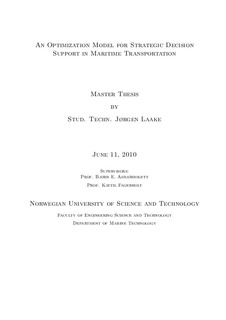| dc.contributor.author | Laake, Jørgen | nb_NO |
| dc.date.accessioned | 2014-12-19T12:05:56Z | |
| dc.date.available | 2014-12-19T12:05:56Z | |
| dc.date.created | 2010-12-07 | nb_NO |
| dc.date.issued | 2010 | nb_NO |
| dc.identifier | 375178 | nb_NO |
| dc.identifier.uri | http://hdl.handle.net/11250/237801 | |
| dc.description.abstract | Approximately 80% of the world trade measured in volume is carried at sea and there are accordingly many different actors making the shipping industry close to a perfect market. The shipping industry is also a highly volatile industry with abrupt market fluctuations. Under such premises correct timing of decisions becomes essential for those who want to succeed. The nature of the shipping industry also makes it difficult to conduct strategic planning because the fluctuations and irregular pattern between the cycles make the future hard to predict.
In this thesis an optimization model that can be used as a tool for strategic planners is presented. An introduction to the shipping industry is given in order to set the background for developing an optimization model. Different types of planning are discussed and important issues connected to strategic planning in shipping are addressed.
A deterministic optimization model is presented which suggest the strategic long term decisions that will yield the highest profit for a given planning period. It can be used to evaluate contracts up against each other and find the best mix of COAs and spot contracts for a given fleet, find the optimal fleet size & mix for a set of contracts or a mix of both. In that way it is a very flexible model that can be adapted to fit different scenarios, ranging from small fleets to the larger ones. The model can be used as a basis for a fleet renewal program, helping to decide when to sell and whether to buy old or new ships. It also takes into consideration the time charter market, recommending when to charter in vessels and when to charter out. Another area of application is for users that only are engaged in active vessel trading and not in transportation.
A fictional case is used to illustrate how the model can be used to help the management in a shipping company evaluate different strategies. Limitations related to the model and the uncertainties connected to using forecast data is discussed in the thesis. | nb_NO |
| dc.language | eng | nb_NO |
| dc.publisher | Norges teknisk-naturvitenskapelige universitet, Fakultet for ingeniørvitenskap og teknologi, Institutt for marin teknikk | nb_NO |
| dc.title | An Optimization Model for Strategic Decision Support in Maritime Transportation | nb_NO |
| dc.type | Master thesis | nb_NO |
| dc.contributor.department | Norges teknisk-naturvitenskapelige universitet, Fakultet for ingeniørvitenskap og teknologi, Institutt for marin teknikk | nb_NO |
